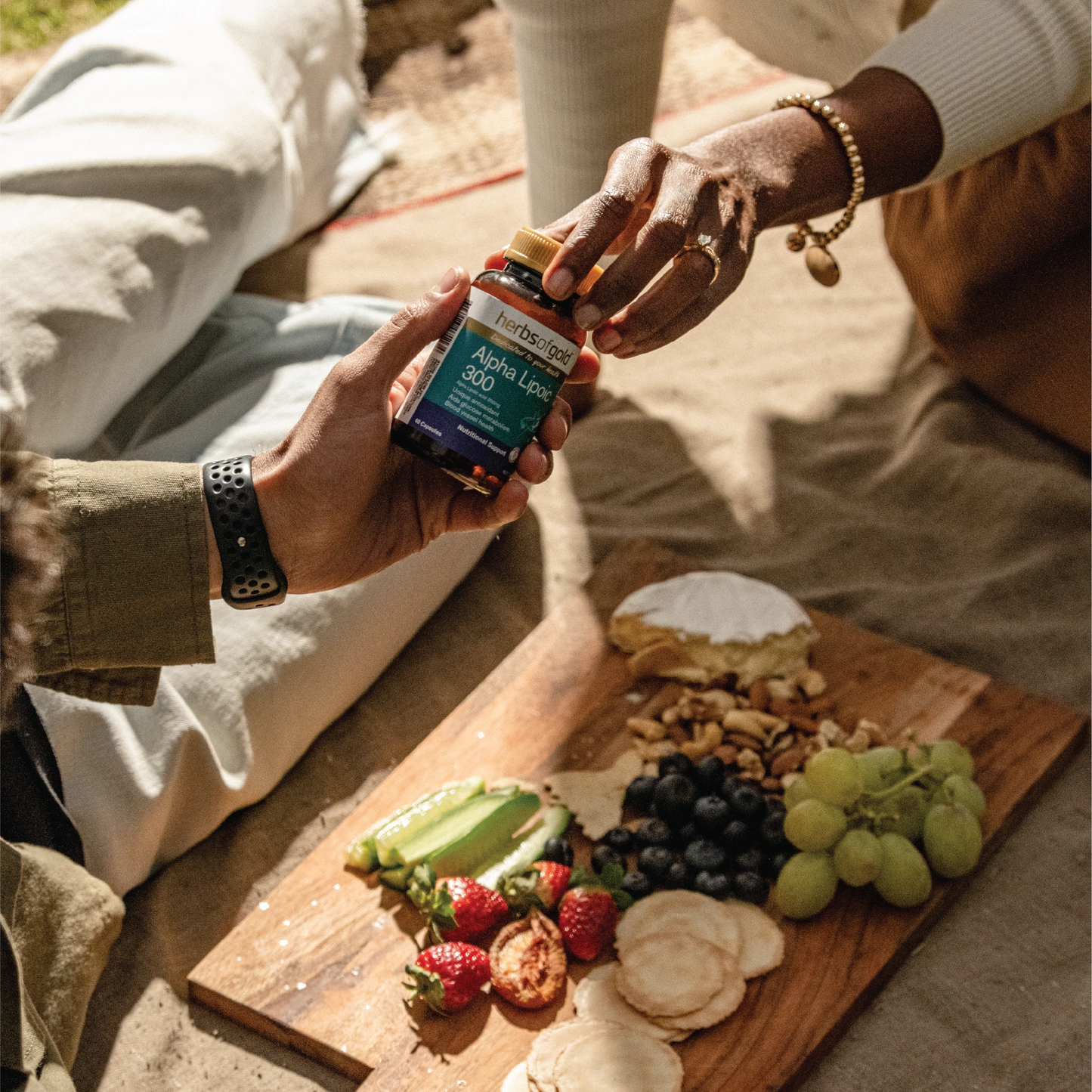Herbs Of Gold
Herbs Of Gold Alpha Lipoic 300, 60 Or 120 VegeCapsules (Vegan)
Herbs Of Gold Alpha Lipoic 300, 60 Or 120 VegeCapsules (Vegan)
Couldn't load pickup availability
Potent antioxidant recycler
Herbs of Gold Alpha Lipoic 300 contains high-strength alpha Lipoic acid, an antioxidant that reduces free radicals formed in the body.
Indications
-
Alpha Lipoic 300 is a unique antioxidant that neutralises free radicals in both fat and water soluble tissues in the body.
-
Alpha Lipoic acid strengthens the body's antioxidant network by regenerating and prolonging the life of other antioxidants, including vitamins C and E and glutathione.
-
Alpha Lipoic acid helps maintain cellular uptake of sugar and assists sugar metabolism.
-
Alpha Lipoic acid supports energy production, blood vessel health and nervous system function.
Directions
Adults and children over 12 years - Take 1 capsule, once or twice daily, with food, or as directed by your health professional.
WARNINGS
Dietary supplements should not replace a balanced diet.
Ingredients
Each capsule contains:
| alpha Lipoic acid (R,S-alpha Lipoic acid) | 300mg |
Does not contain egg, milk, peanut, corn, soy, tree nuts, animal products, gluten, lactose or artificial colours, flavours or preservatives.
About Herbs Of Gold
Proudly Australian owned, the Herbs of Gold team are devoted to bringing to market high-quality, therapeutic formulas that nourish the health of both adults and children as they live, grow, work and play.
Our team of highly qualified experienced naturopaths, herbalists and nutritionists focus on developing products to suit people of all ages, life stages and personal preferences. We pride ourselves on our strong vegan-friendly range that is low allergy and free from artificial colours, flavours and sweeteners, with our children’s range completely sugar-free.
We draw from the wisdom of the past and combine it with the knowledge of the future, taking the understanding of the traditional use of ingredients and blending it with the latest scientific research for their use in complementary therapies. Respecting an ingredient's traditional and modern use underpins our approach to developing supplements that support the ongoing health of both the body and the mind. Each step of our manufacturing process, from the selection of raw materials right through to the manufacture of the finished product, is performed with utmost care.
Share
Instore Pickup
Instore Pickup
Pickup is free of charge and is available for Restaurant / Smoothie Bar products ONLY.
Operating hours are:
Mon - Thurs: 7am - 8pm
Fri: 7am - 6pm
Sat: 8am - 6pm
Sun: 8am - 2pm
Shipping Information
Shipping Information
Health Nuts Australia offers Australia Post delivery options. Orders are generally processed within forty eight (48) hours* to seventy two hours (72) after payment confirmation. Please reach out to our customer service if you would like Express Postage (*excluding public holidays and weekends). Delivery times may vary depending on the volume of customer orders. Health Nuts Australia is not responsible for any loss, damage or theft of goods if left by Australia Post. If the package is returned to Health Nuts Australia by the courier, Health Nuts Australia will refund the cost of the product only. All shipping and handling will not be refunded. Health Nuts Australia will recharge for any shipping and handling to resend the product.
Returns Policy
Returns Policy
Refund policy If you need to return a product, we want to make the process simple and easy for you in the instance that item is damaged or incorrectly supplied. Please call our team within 48 hours of receipt of goods, or email within 48 hours of receipt of goods and attach an image of the product with your email. We will issue a return reference number to be included with the returned goods. Any claims outside this time-frame will not be accepted. Credits will be processed when goods are received back to our distribution centre. Goods sent back without prior advice being given to us will not be accepted. Health Nuts Australia are unable to issue returns or credits for perishable and fresh produce items, as well as unwanted or incorrectly ordered items. Returns cannot be redeemed for cash and Health Nuts Australia will issue an on-line credit only.










